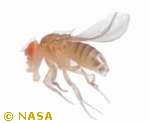Friday, September 08, 2006
Genetic Surprise Confirms Neglected 70-Year-Old Evolutionary Theory
 Mobile Genes Found to Pressure Species Formation
Mobile Genes Found to Pressure Species Formation
Biologists at the University of Rochester have discovered that an old and relatively unpopular theory about how a single species can split in two turns out to be accurate after all, and acting in nature.
The finding, reported in today's issue of the journal Science (September 8, 2006), reveals that scientists must reassess the processes involved in the origin of species. The beginnings of speciation, suggests the paper, can be triggered by genes that change their locations in a genome...
...Masly brought together two species of fruit fly - the workhorses of the genetics world - to see what genes were active when they were crossbred. One species, Drosophila melanogaster, had its genome already sequenced, making that part of the job much easier. The second species, Drosophila simulans, was still in the process of being sequenced, which meant much of the work had to be done by hand by Masly and his collaborators... [News, New York]
--
Based on "Gene Transposition as a Cause of Hybrid Sterility in Drosophila" (Abstract)
technorati tags: mobile+genes, species, formation, university, rochester, new+york, unpopular, theory, journal, science, origin, speciation, genes, genome, fruit-fly, drosophila, melanogaster, hybrid, sterility, gene, news, transposition
Add to: CiteUlike | Connotea | Del.icio.us | Digg | Furl | Newsvine | Reddit | Yahoo